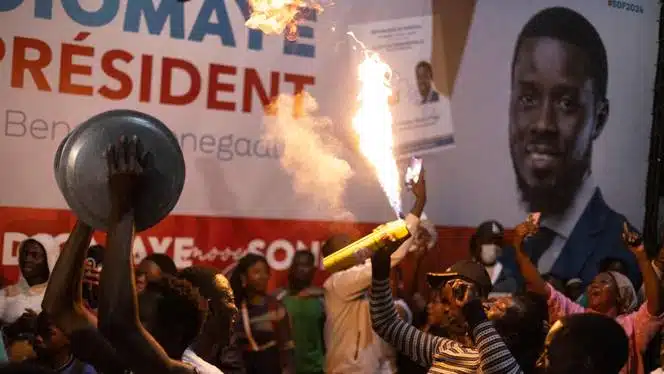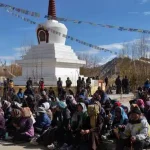With the major competitor of the opposition candidate, Amadou Ba, stepping down from the race after the first round of voting on Sunday, 44-year-old Bassirou Diomaye Faye will become Senegal’s fifth and youngest president.
After his opponent conceded the contest, sending shockwaves through the West African nation, anti-establishment contender Bassirou Diomaye Faye was poised to become Senegal’s youngest president in history.
The 44-year-old, who was only released from prison 10 days prior to Sunday’s election—the results of which are still pending—marks an unexpected triumph on Monday.
This is the first time an opposition candidate has won the first round of voting in the twelve presidential elections conducted under universal suffrage since Senegal separated from France in 1960.
Amadou Ba, 62, his principal rival from the ruling coalition, called Faye to congratulate him on his victory.
He was applauded by outgoing President Macky Sall, who did not run for office following victories in 2012 and 2019 and hailed “a victory for Senegalese democracy”.
In light of the upcoming start of production on recently discovered oil and gas reserves later this year, Faye has pledged to renegotiate gas and oil contracts with Senegal in addition to advocating left-wing pan-Africanism.
Since the vote, which came after three years of turmoil and a political crisis, the opposition candidate has never held a position of national election authority and has not made a public appearance.
Provisional results from individual polling stations, released by the local media and on social media, showed that Faye had clearly outperformed previous prime minister Ba.
We anticipate official results before the end of this week. A first-round victory required an absolute majority.
“Total revolution”
Late on Sunday, hundreds of ecstatic Faye fans gathered at his campaign offices in Dakar, the country’s capital.
It’s a complete transformation. Everything will alter. Everything is going to change in terms of behavior, society, and finances, according to musician Coumba Diallo, often known as Queen Biz.
Based on preliminary findings released by the media earlier on Monday, at least ten of the seventeen presidential contenders had congratulated Faye.
Notwithstanding three years of periods of turmoil and an abrupt postponement of the election, no significant incidents were reported during the voting process.
On March 14, Faye and Sonko were released from prison in accordance with a hastily enacted amnesty statute.
On suspicion of being involved in a standoff between Sonko and the state, he was imprisoned last year.
Sonko’s conviction for defamation prevented him from participating in the presidential election.
Faye has promised to combat corruption, reestablish the nation’s “sovereignty,” and allocate resources more fairly.
In addition, he has pledged to renegotiate agreements with foreign firms on mining, gas, and oil.
When casting his ballot on Sunday, Faye declared, “I remain confident about the choice for the change that I am able to embody better than any other candidate.”
Delay
Senegal was supposed to vote on February 25, but Sall abruptly postponed it at the last minute, sparking the deadliest political crisis in decades and bloody clashes that claimed four lives.
Of Senegal’s 18 million inhabitants, about 7.3 million were able to cast ballots. Following carefully, the election was seen as a model of democracy in coup-hit West Africa.
Since Senegal’s independence, this is the country’s third democratic transition of power between elected leaders.
There were hundreds of observers there from the European Union, the African Union, the ECOWAS regional body, and civil society.
Malin Bjork, the director of the EU delegation, reported that voting had happened “calmly, efficiently and [in a] very orderly manner”.
Following weeks of uncertainty, Sall was compelled to reschedule the vote from December to March 24 by Senegal’s highest constitutional court, which overruled his request to postpone it until then. This resulted in a hurried campaign that coincided with the Muslim month of Ramadan.
Muslims make up about 97% of Senegal’s population.
Sall left behind a legacy of mass arrests, enduring poverty, 20 percent unemployment, and thousands of migrants risking their lives every year to reach Europe.
SOURCE: TRTWORLD






